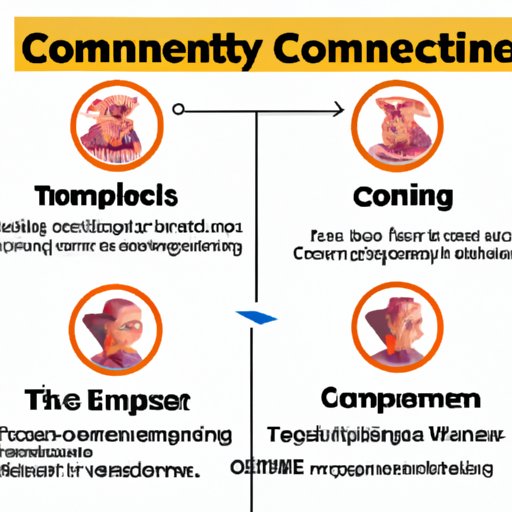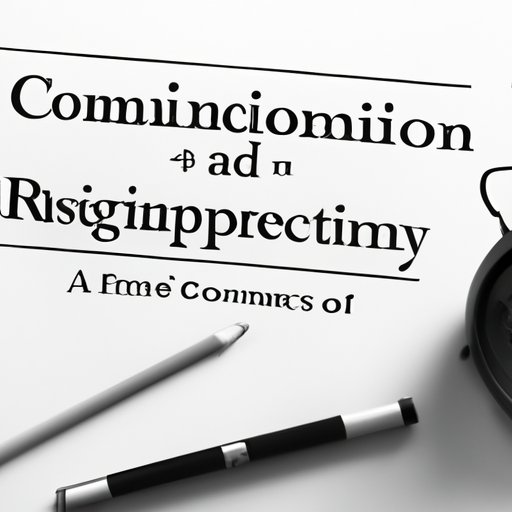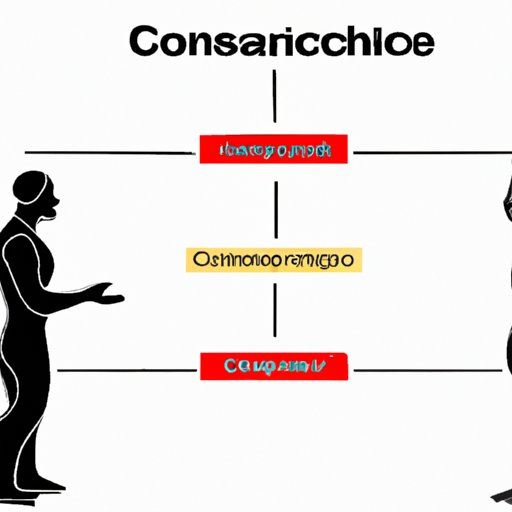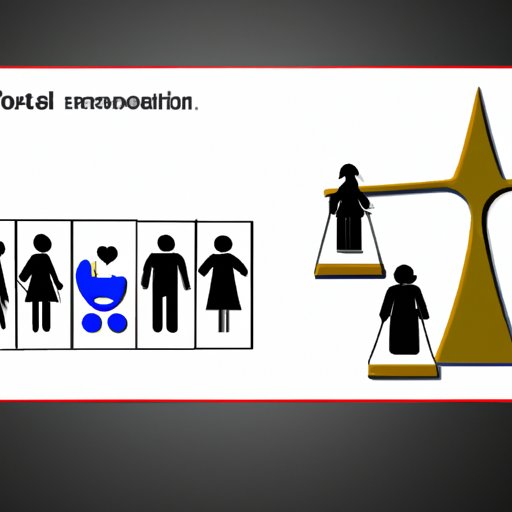Introduction
Conscience is an inner feeling or voice of morality that guides our decisions and actions. It’s often referred to as a “moral compass” and has been studied extensively by both psychologists and philosophers. But what exactly is conscience, and how does it impact our moral decision making? This article will explore these questions in depth, looking at how to develop a strong conscience, examining the correlation between conscience and religion, understanding the development of conscience in children, analysing the impact of conscience on human behavior, and considering the role of conscience in society.

How to Develop a Strong Conscience
Having a strong conscience is essential for making good ethical decisions. But how do we develop and strengthen our conscience? According to research, there are several key steps that can be taken to nurture a healthy moral compass.
The Importance of Self-Reflection
Self-reflection is critical for developing a strong conscience. We must take the time to consider our own beliefs, values, and motivations when making decisions. As William Wordsworth once said, “Fill your paper with the breathings of your heart.” Taking the time to reflect on our innermost thoughts and feelings can help us gain greater insight into our own moral code.
Understanding Your Own Values and Beliefs
It’s also important to have a clear understanding of our own values and beliefs. We need to know what we stand for and why we believe what we do. Doing so can help us make more informed decisions that align with our personal values. As psychologist Carl Rogers said, “The only person who is educated is the one who has learned how to learn and change.”
Learning From Mistakes
We all make mistakes, but it’s important to learn from them. Reflecting on our past decisions can help us make better choices in the future. As author Mary Schmich wrote, “Don’t be afraid to make mistakes. The worst thing that can happen is you learn something.”
Seeking Advice from Others
Finally, it’s beneficial to seek advice from others. Talking to people we trust can help us gain perspective and clarity on difficult decisions. As the saying goes, two heads are better than one.

Examining the Correlation Between Conscience and Religion
Religion has long been intertwined with conscience. Many religious teachings emphasize the importance of morality and making ethical decisions. But what is the relationship between conscience and religion? Let’s explore this further.
Examining Religious Teachings on Conscience
Most religious traditions have teachings on conscience. In Christianity, for example, it’s believed that God has given us a conscience so that we can make moral decisions. The Bible states, “He who keeps his commandments keeps his soul; he who despises his ways will die” (Proverbs 19:16). Similarly, in Islam, it’s believed that Allah has placed a sense of right and wrong in our hearts. The Quran states, “We have truly sent down to you the Book, for men to walk in the paths of righteousness” (Surah Al-Anam 6:155).
Considering Different Views on Conscience
Of course, not all religions have the same view on conscience. For example, some Eastern philosophies, such as Buddhism, don’t emphasize the importance of conscience as much as other religious traditions do. Instead, they focus more on cultivating wisdom and understanding. As the Buddha said, “You yourself must strive. The Buddhas only point the way.”
A Guide to Understanding the Development of Conscience in Children
Children’s consciences are still developing, and parents play an important role in shaping their moral development. Let’s look at some key factors that influence how a child’s conscience develops.
Stages of Conscience Development
Psychologist Lawrence Kohlberg proposed a theory of six stages of moral development. According to this theory, children progress through these stages as they mature and gain a better understanding of right and wrong. The first three stages focus on obedience to authority, while the last three emphasize internalizing moral values and making independent moral decisions.
Parental Influences on Moral Development
Parents also play an important role in a child’s moral development. Research shows that parental warmth, consistency, and support can help children develop a stronger conscience. Parental modelling is also important, as children often mimic the behaviour of their parents. As psychoanalyst Sigmund Freud said, “The most important thing a father can do for his children is to love their mother.”

The Impact of Conscience on Human Behavior
Now that we’ve explored the development of conscience in children, let’s look at how conscience impacts our behaviour as adults. Several factors can influence our moral decisions and behaviour.
Factors That Influence Moral Behavior
Research suggests that several factors can influence our moral behaviour. These include our values and beliefs, our emotional state, and our cultural and social environment. For example, if we feel strongly about a certain issue, we may be more likely to act on it. As philosopher Jean-Paul Sartre said, “Man is condemned to be free; because once thrown into the world, he is responsible for everything he does.”
Exploring the Relationship Between Emotions and Conscience
It’s also important to consider the relationship between emotions and conscience. Research suggests that emotions can influence our moral decisions. For example, if we feel guilty about a certain action, we may be less likely to engage in it. As psychologist Daniel Goleman said, “Emotions provide a kind of moral intuition, a gut feeling about the rightness or wrongness of an action.”
Analyzing the Role of Conscience in Society
Finally, let’s examine the role of conscience in society. Societal norms and expectations can shape our moral behaviour, as can group dynamics. Let’s look at these factors in more detail.
Looking at Social Norms and Expectations
Social norms and expectations can have a powerful influence on our behaviour. We are often expected to conform to certain standards and behave in certain ways. As sociologist Émile Durkheim said, “Society is nothing more than the shared consciousness of its members.”
Examining the Impact of Group Dynamics on Conscience
Group dynamics can also impact our moral decisions. Being part of a group can cause us to act in ways that we wouldn’t normally act, as groupthink can lead to a lack of individual responsibility. As psychologist Irving Janis said, “Groupthink is a quick and easy way to reach agreement, but it is often based on faulty assumptions and poor information.”
Conclusion
In conclusion, conscience plays an important role in our moral decision making. We must take the time to develop and strengthen our conscience, understanding our own values and beliefs, learning from our mistakes, and seeking advice from others. We must also consider the role of religion and parental influences in shaping our conscience. Finally, we must examine how conscience impacts our behaviour, as well as the role of conscience in society. By doing so, we can become more aware of our moral decisions and actions, enabling us to make better choices.
Summary
This article examined the role of conscience in moral decision making, exploring how to develop a strong conscience, how religion and parental influences shape conscience development, and how conscience impacts human behavior and society. It highlighted the importance of self-reflection, understanding our own values and beliefs, learning from mistakes, and seeking advice from others. It also discussed the correlation between conscience and religion, as well as the development of conscience in children and the impact of conscience on human behavior. Finally, it considered the role of conscience in society, looking at social norms and expectations and the impact of group dynamics on conscience.
Final Thoughts
Conscience is an essential part of our lives. It guides our decisions and shapes our behaviour. By taking the time to understand our conscience and how it impacts our moral decision making, we can become more mindful of our actions and make better choices.
(Note: Is this article not meeting your expectations? Do you have knowledge or insights to share? Unlock new opportunities and expand your reach by joining our authors team. Click Registration to join us and share your expertise with our readers.)
